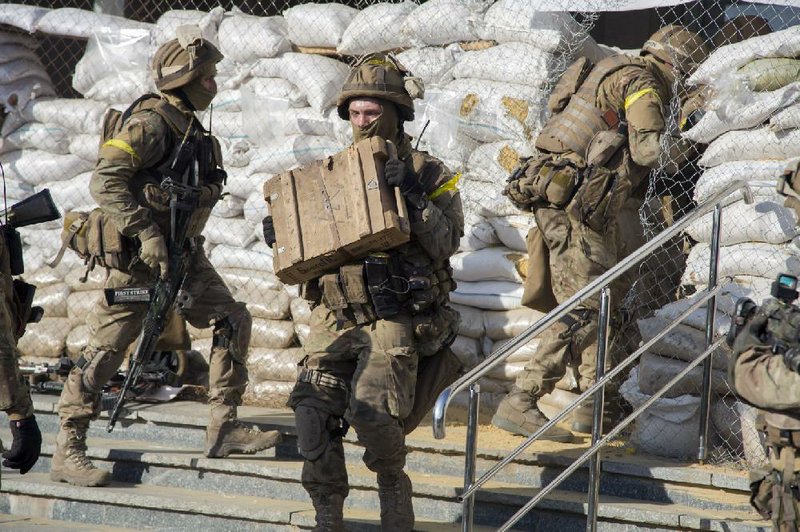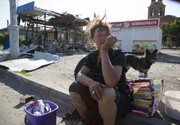KIEV, Ukraine -- With an onslaught of gunfire and mortar shells, Ukrainian government forces on Saturday expelled pro-Russia insurgents from Slovyansk, a long-blockaded rebel stronghold, government officials and separatist leaders said.
After rebels fled the city, the scene of some of the fiercest battles of the insurrection, government forces raised the blue-and-yellow Ukrainian flag above the City Council building. Troops carried stockpiles of weapons out of the city's administrative and police buildings, which have been under rebel control since early April.
Ukraine's newly appointed Minister of Defense Valery Heletey visited troops in the city center. He said three planes with food and other supplies will soon arrive in Slovyansk.
A spokesman for the National Security and Defense Council said earlier that mopping-up operations were continuing.
"Slovyansk is under siege. Now an operation is going on to neutralize small groups hiding in buildings where peaceful citizens are living," Andriy Lysenko said.
While it was not clear that retaking Slovyansk signaled a decisive blow against the rebels, it showed that Ukrainian forces are gaining traction and reasserting state authority in eastern Ukraine, three months after separatists seized cities and towns throughout the region.
"The state flag of Ukraine is proudly waving over the city, which militants thought was their impregnable fortress," President Petro Poroshenko declared in a statement. "It's not a complete victory and it's not a time for fireworks, but clearing Slovyansk of extremely well-armed bandits has a very symbolic meaning. This is a turning point in fighting militants for the territorial integrity of Ukraine."
The Ukrainian advance came four days after Poroshenko ended a cease-fire and ordered the military to resume efforts to crush the rebellion by force. On Tuesday, Ukrainian forces retook an important checkpoint at a border crossing with Russia, one of several seized by rebels and that the Ukrainian government and its Western allies said were used to allow Russian tanks, weapons and fighters to cross into the region.
There were no firm tallies of casualties, though officials said one government soldier had been killed and three wounded in fighting outside the city, and one separatist leader reported that about 150 rebels had sought medical help in Donetsk, the regional capital.
Ukrainian soldiers chasing rebels out of Slovyansk destroyed a tank, two combat vehicles and two armored personnel carriers, Lysenko said.
Rebel leaders confirmed that their fighters had fled under heavy attack by the Ukrainian military but insisted that it was only a temporary setback. "You think you won?" Denis Pushilin, the parliament speaker of the self-declared Donetsk People's Republic, wrote on Twitter. "This was a tactical move. We will enter Slovyansk victoriously."
Andrei Purgin, an insurgent leader, said rebels abandoned the city because they were overwhelmed. "What would you do if you were shelled with mortars and artillery guns and pounded from the air, and you had only three tanks and assault rifles?" he said in an interview with the Interfax news service. "The Ukrainian security forces, in fact, tried to raze Slovyansk to the ground."
"More than 100 militiamen have been killed in the last three days," said Viktor, a 35-year-old Slovyansk resident who had a shrapnel wound in his leg. "The mood is very bad. It seems that we've lost this war. And Russia isn't in a hurry to help."
Some rebels played down the significance of Ukraine's advances. Pavel Gubarev, the self-described governor of the Donetsk People's Republic, wrote online that the rebels had staged a tactical retreat.
"Kutuzov also retreated, as that was the plan," he wrote, referring to the 19th-century Gen. Mikhail Kutuzov, who is credited with defeating Napoleon's forces in Russia. "In general, Russians only retreat before a decisively victorious battle."
Government officials were jubilant. "Run!" Ukrainian Interior Minister Arsen Avakov wrote in a Facebook post on the retaking of Slovyansk. "The terrorists are bearing losses, surrendering."
Ukrainian officials said those fleeing included Igor Girkin, the self-described commander in chief of the Donetsk People's Republic who authorities said worked for the Russian military's foreign intelligence directorate. In east Ukraine, he identified himself as Col. Igor Strelkov, which means shooter or gunman.
In a video posted online late Friday, Girkin pleaded with Russia to assist the rebels, saying his men had "lost the will to fight."
"They want to live in Russia," said Girkin. "But when they tried to assert this right, Russia doesn't want to help." He said he believed the troops had only "two or three weeks" before they were defeated if Russia did not step in.
The Russian Foreign Ministry said it was bolstering efforts to deliver medical aid to those in eastern Ukraine but made no mention of the rebels' defeat in Slovyansk or plans to provide military aid.
By midday Saturday, government troops were sweeping through neighborhoods of Slovyansk in search of any remaining fighters, officials said. Oleksandr Turchynov, the Ukrainian Parliament speaker, arrived at a checkpoint near Slovyansk, wearing military fatigues and body armor and spoke to a television crew as explosions could be heard in the background.
"As you hear," Turchynov said, "the anti-terror cooperation is going on, and units that take part in fighting the terrorists are going both east and south of Donetsk region. In parallel to that, the special forces units are controlling Krasny Liman to see if there are remnants of terrorist groups."
Slovyansk, once a quiet industrial city, was one of the first cities to come fully under rebel control after the start of the insurrection in April, and then it was put under blockade by government forces, which set up checkpoints on approaches outside the city. Since early April, it has been the site of numerous battles, with frequent machine-gun fire and mortar shelling.
Local news services in eastern Ukraine reported that insurgents were traveling south from Slovyansk toward Donetsk and that residents were fleeing the city fearing an imminent attack by the Ukrainian military.
Streets were deserted in Donetsk on Saturday as local officials urged people to stay at home. They said a battle was ongoing near the city's airport but did not provide details.
"Militants from Slovyansk and Kramatorsk have arrived in Donetsk," said Maxim Rovinsky, spokesman for the City Council.
By Saturday evening, Ukrainian troops also had raised the national flag over City Hall in Kramatorsk.
Poroshenko said Friday that he was ready to conduct another round of talks with representatives from Ukraine, Russia and the rebels. But with the rebels reeling from the fighting Saturday, it was unclear whether negotiations could take place.
"That possibility still exists," said Purgin. "We don't exclude that the talks could happen in Minsk, because the situation in Donetsk has escalated. Different options are now under discussion."
In statements Saturday, the Russian government warned of rising civilian deaths and called for a resumption of the peace talks.
Russian Foreign Minister Sergey Lavrov said in a statement that he had spoken with his counterparts from France and Germany on Saturday and told them that the talks were needed "given the rapid deterioration of the situation as a result of the military operational capacity of the Ukrainian authorities, proliferating civilian casualties and destruction of civilian infrastructure."
Poroshenko has said a truce is only possible after he gets confirmation that it will be honored by separatists. Poroshenko has blamed the insurgents for breaking the 10-day cease-fire more than 100 times while killing 27 soldiers and wounding 69.
As the government reported its success in Slovyansk, the Ukrainian Orthodox Church on Saturday announced the death of Metropolitan Volodymyr, 78, the leader of the church's Moscow patriarchate who had struggled, through illness, to be a voice of conciliation in the political turmoil that has divided Ukraine and Russia.
Volodymyr's death could have broad political implications, setting the stage for a battle between clerics seeking closer ties with the Russian Orthodox Church, based in Moscow, and those who want a more independent, distinctly Ukrainian church.
Ukraine is a deeply religious country, and the overwhelming majority of the population identifies as Orthodox. The church, however, is split largely between the Moscow patriarchate, which is beholden to Patriarch Kirill of the Russian Orthodox Church, a close ally of Putin's, and the Kiev patriarchate, which Moscow does not recognize.
Volodymyr had suffered from Parkinson's disease and other ailments, including cancer. In a statement on Saturday expressing condolences, Poroshenko said Volodymyr "led the church at the time of its revival after decades of brutal persecution" during the Soviet Union era.
"His ministry was full of love for his native Ukraine," Poroshenko said.
It was not immediately clear whether Poroshenko would order a state funeral, which would put the government, rather than the church, in charge of arrangements and invitations.
Information for this article was contributed by David M. Herszenhorn and Daniel Rzhenetskyy of The New York Times; by Dmitry Lovetsky, Yuras Karmanau, Balint Szlanko and Laura Mills of The Associated Press; and by Volodymyr Verbyany, Stepan Kravchenko, Daryna Krasnolutska, Ksenia Galouchko, Scott Rose, Elena Mazneva, Helene Fouquet, Agnes Lovasz, Leon Mangasarian and Patrick Donahue of Bloomberg News.
A Section on 07/06/2014



